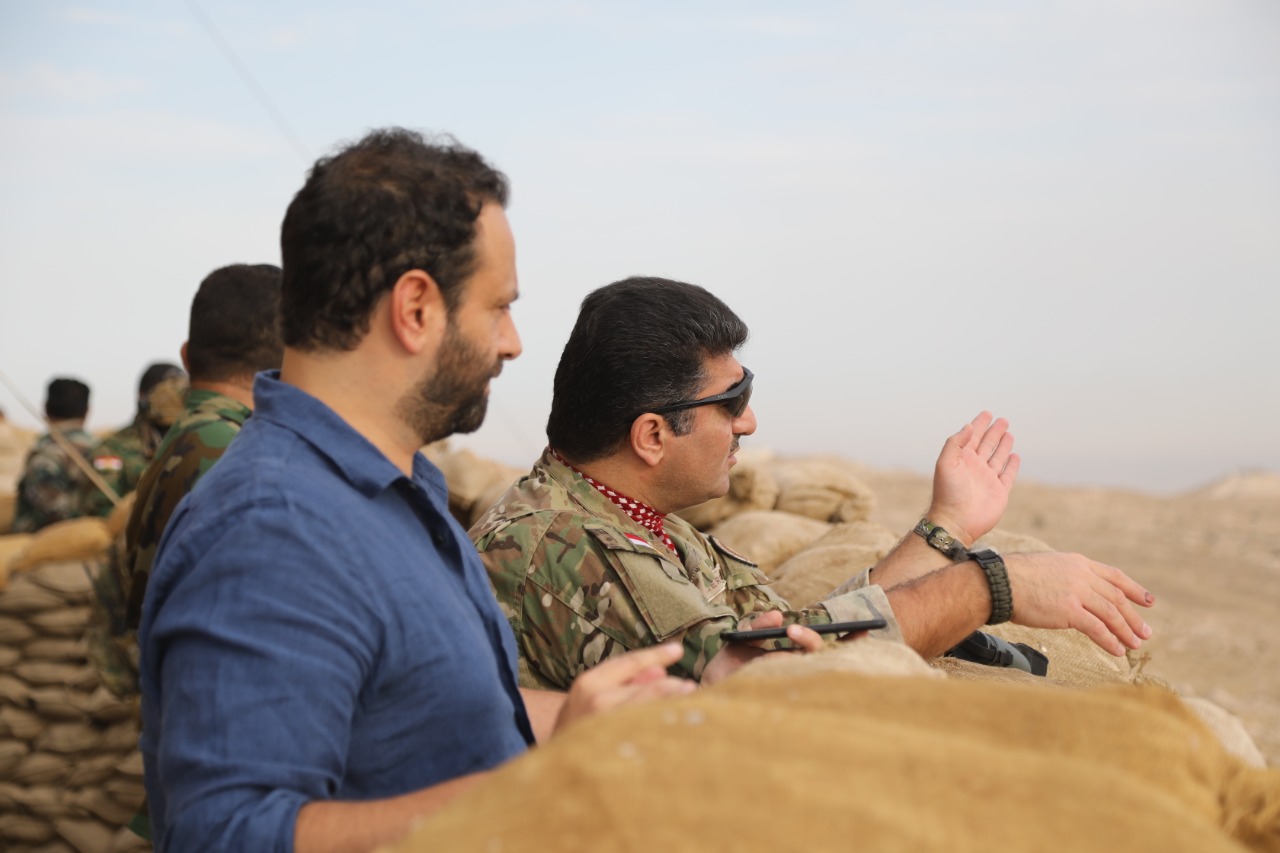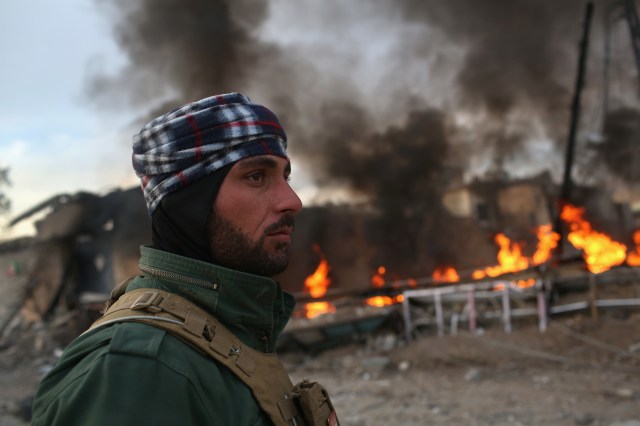
“George W. Bush is a hero.” General Sirwan Barzani utters these words with quiet satisfaction. “The best thing that happened to Iraq, at least to us Kurds, was its liberation in 2003. He liberated all of Iraq from dictatorship. It was a great move.”
It is not often you hear words like these, especially in Iraq. But Barzani is no ordinary Iraqi. As well as being the nephew to the former President of Iraqi Kurdistan, Masoud Barzani, he is also first cousin of the incumbent, Nechirvan Barzani, a general in the Kurdish Peshmerga army, and a Telecoms billionaire.
I first met him in October 2021, just after the last Iraqi elections, at his base, the Black Tiger camp (Black Tiger was his military call sign), on the disputed borders of the Kurdistan region of Iraq. Barzani is a hero to many in the region. He and his troops were the tip of the Kurdish spear against Isis in northern Iraq. They fought them hard and won, but they paid in blood — an old story for Barzani who spent the Nineties battling Saddam Hussein’s forces in the Kurdish mountains.
The results of that election were, as ever, reflective of the sectarianism that strafes Iraqi politics. The Sadrist Movement, led by Shi’ite Muslim cleric Muqtada al-Sadr — an Iraqi nationalist and no friend of Iran — was the largest party with 73 seats, but was short of the majority needed to form a government; the Iran-backed Shi’ite Al-Fatah saw its vote drop from 48 to just 17. Sunni parties formed the second sectarian block. The Kurds came in third, with their major party, the Kurdistan Patriotic Union (KDP), taking 16 seats. The various blocs then haggled for more than a year to form a functioning government, until, in October 2022, Mohammed Shia’ Sabbar Al-Sudani was nominated to take office as Prime Minister. Iraqi democracy had finally kicked into gear again.
“Twenty years on, the situation is good, especially when compared to 2003,” Barzani told me last week. “We finally have democracy. It’s not perfect of course, and it may take 20 or 30 years for it to become mature, but it exists.” Democracy is an important word for Barzani — and for the Kurds of northern Iraq generally. During my trip to Black Tiger Camp just after the elections, I remember noticing how the tip of each soldier’s right index finger was covered in violet phosphorous-based ink, signifying that their vote had been cast. Barzani’s, I noted, seemed a little more faded than the rest. “It’s because he voted first,” an aide told me.
But if Barzani is now cautiously content with the state of Iraqi democracy, that is only half the story of post-2003 Iraq. The Kurds remain the world’s largest stateless population; their desire for a homeland stretches back centuries. I was in the region’s capital Erbil to cover the 2017 referendum when, against the implicit desires of Washington and the unambiguous orders of Baghdad, 92.73% of the Kurdistan region of Iraq voted to become an independent state.
As I watched Kurds celebrate in the streets, I remember thinking that the Iraqi government would make them pay for what they had done. And it did: as Iranian tanks massed on the border, Baghdad banned international flights to the region, slapped sanctions on the Kurdistan Regional Government (KRG), and sent troops into the city of Kirkuk and its oilfields. In total, the KRG lost around 40% of its territory. Iraq’s Supreme Federal Court decreed that to preserve the unity of Iraq, no province could be allowed to secede — a ruling the KRG ultimately said it would respect. And so, a unified Iraq remains, as do the sanctions on the Kurdistan region. Yet people here still say it was worth it. Centuries-old dreams of statehood die hard.

Erbil, though, continues to pay for its perceived intransigence. “What happened after the referendum was unfair,” says Barzani. “[To punish us] they cut our government budget and the Peshmerga budget, even after it was left to the Peshmerga to fight on behalf of civilisation against Isis. They sent no money, no equipment, no ammunition. When our leaders and people looked at al-Qaeda, the civil war, Isis and then the weak government which still sanctioned us for wanting independence after all we had done, they were not happy.”
These tensions are present throughout Kurdistan to this day. On the highway out of Erbil, the light turns a wan yellow as it hits the mounds of beige gravel and cement that line the arid land on either side. This part of Iraq may look sparse, but it is rich. Cement, oil, wheat and corn are all grown or produced here. I’m driving with Colonel Surd, head of intelligence of Peshmerga Sector Six (of eight). Six is the largest, stretching to almost 120 square kilometres and is responsible for protecting Erbil.
Six also has another job: to deal with the remnants of Isis who refuse to surrender — the most fanatical members of a former army of fanatics. They are holed up in caves and tunnels across the sector. On the day we meet, the Peshmerga have found more tunnels containing ammunition and grenades. “Daesh [Isis] is an ideology, and many of its people still adhere to it,” Surd says. “They are still active; their sleeper cells are very active. They recruit local people from the Qaraj and Zab and Hawija areas around us. From our thermal cameras we have counted around 60 fighters in no-man’s land. We don’t know if they are the same people or rotating, but based on our intel sources, there are more than 100 villagers who support them. Some because they believe, some for money and some from fear. Isis asks them for food and if they refuse to give it, they kill them.”
We arrive at a Peshmerga outpost: a small gravel-covered compound with a line of armoured vehicles along one side and several low, flat-roofed buildings on the other. In the largest, I meet Lieutenant Colonel Aziz, the commander of Battalion Two, Division 14. “We watch for them [Isis] 24/7,” he tells me. “The last major fight was during August 2021. They blew up a tower and then, by the checkpoint we just passed, took some civilians, eventually exchanging them for ransom.” In December 2021, they attacked again, killing three civilians. “We pursued them into the mountains, but they had laid an IED on the road, and 10 of our Peshmerga were martyred. After that, we changed our strategy. But I still ask myself: they are the enemy, they are outside the law — yet they have night-vision equipment, which we do not, and all the latest tech. How?”
As if to prove his point, in Erbil later that day I am told that two coalition drones recently disappeared from the sky. Isis, my source explains, has anti-drone jamming equipment. The battle may be a low-level one, but it is fierce. In 2021, I accompanied Barzani to the front where Peshmerga would abseil down into caves housing Isis fighters and fire anti-tank rockets into darkness. It was, I was told, the most efficient way to deal with them.
Another soldier who declines to be named, but who has been itching to speak, interjects. “Isis tells you the situation Iraq is still unstable, even 20 years after the removal of Saddam. [With Isis], we have our feet on a landmine — it could go off at any time, and it will either take off a leg or kill you. This is Iraq in 2023. Before we had one Saddam, now we have militia leaders and corrupt politicians and foreign enemies.”
The soldier goes on to describe Iraq as “a failed marriage” between three groups — the Shia, Sunni and Kurds — who have been forced together. “A three-state confederation is the best choice for Iraq right now. While there is a Sunni governor in Mosul, Hashd [the Shia militias] control the city. A confederation of states for Sunnis, Shias and Kurds would fix this. Then, each group will have no choice but to go back to their part of the state, which will create less problems in every region.”
When I later raise the issue of a “three-state solution” with Barzani, he is more circumspect. “It’s strange,” he says. “Many of the people for whom a united Iraq seems an almost holy enterprise are also those who rail most against the Kafirs [infidels]. I always ask: if they hate Kafirs so much, why do they revere the work of the two Kafirs — Sykes and Picot — who created modern Iraq and started so much of this mess?”
Barzani sees double standards at work when it comes to Baghdad’s treatment of Kurdistan. “When it comes to the budget, we are not Iraqis. When it comes to money and equipment for the Peshmerga, we are not Iraqis. When it comes to the disputed territories, we are not Iraqis. But when they need us to fight Isis, we are Iraqis — the bravest Iraqis — and even then, they didn’t give us any money or weapons for the fight. We don’t need much: just the tech, intelligence, and drones to support us on the ground.”
I ask him what he thinks might happen when the Coalition eventually leaves Iraq, in all forms, for good. He pauses, and then, in an even tone, answers. “Let me be plain: it will be catastrophic. When they withdrew from Afghanistan, we saw first-hand how that empowered Isis; it gave their fighters hope they would do the same here. And when the Americans withdrew the troops in 2011, we also saw what happened: al-Qaeda, the civil war and then Isis. If they withdraw their support, the same scenario will repeat itself — the state will fracture.”
In other words, the Kurdish fight against the Isis resistance is representative of something greater: of the chaos and failure of post-2003 Iraq. What was arguably the state’s greatest victory turns out to have been incomplete: violence in Iraq is never far below the surface and, once more, it is the Kurds who are facing the fallout of it all.
They remain a patient people. History has given them little choice. But everything has its limits. “I hope the present government can continue with its good work, but the three-state solution is always on the table,” Barzani concludes. “And if Iraq reverts to what it was in 2011 and implodes then, one day, it will become the only solution.”










Join the discussion
Join like minded readers that support our journalism by becoming a paid subscriber
To join the discussion in the comments, become a paid subscriber.
Join like minded readers that support our journalism, read unlimited articles and enjoy other subscriber-only benefits.
Subscribe